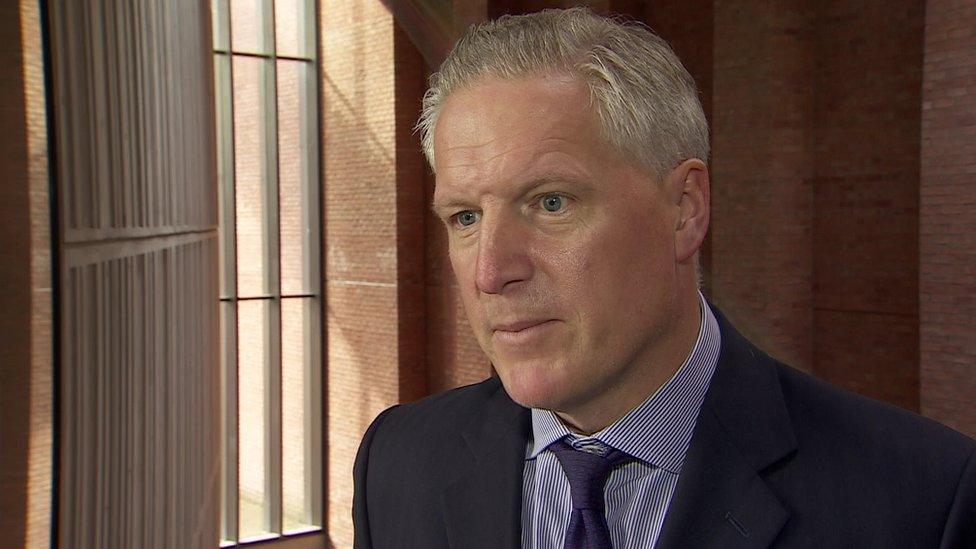GPs say urgent action needed to help retain staff
- Published
- comments
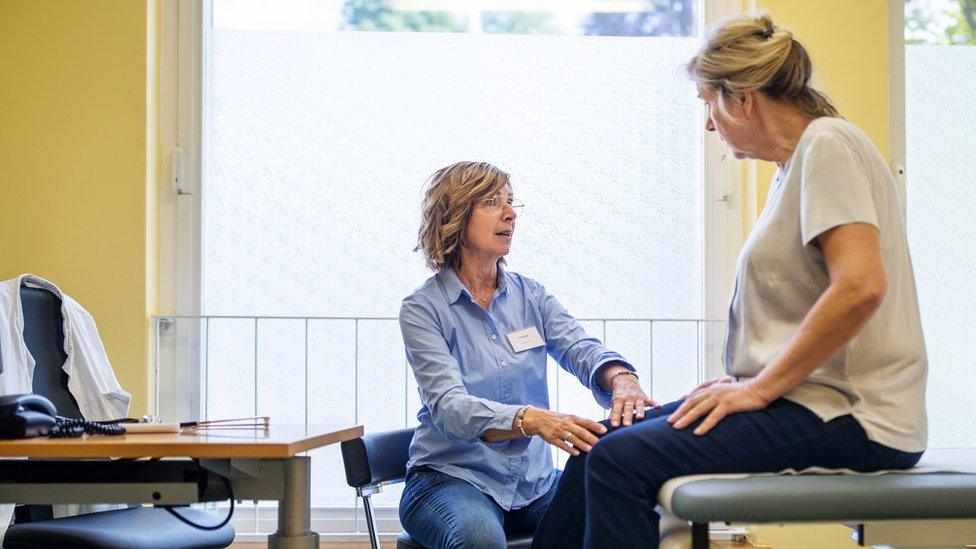
GP services are in crisis and urgent action is needed to ensure doctors stay in the profession and in Northern Ireland, according to a report.
The Royal College of GPs NI said an "unsustainable" workload meant doctors were "beyond burnout".
While the number of GPs had increased since 2014, fewer were working full time, their report said.
Dr Ursula Mason from the college said GPs in Northern Ireland were trying to do "more and more with less and less".
The health minister said he was committed to building the workforce and retaining experienced GPs.
The problems facing GPs have been well documented - escalating demand, an increasingly ageing population, rising rates of multiple conditions, the effects of the Covid pandemic and waiting lists for specialist care.
These are compounded by newly qualified GPs leaving to work elsewhere as conditions are better or others retiring early.
One doctor told BBC News NI that spending quality time with patients and receiving pay parity would encourage more GPs to remain in Northern Ireland.
Dr Laura McGartland is one of four GP fellows in NI, which means she is mentored for 12 months and has a variety of roles across one practice and hospital dermatology.
"The variety of work is encouraging me to stay at the minute also I am working in dermatology and learning about that specialism - I'm learning all the time," the 31-year-old said.
"Pay parity is important and some of my colleagues who I graduated with have moved to England and the Republic of Ireland where pay is better and in some areas there are more GPs so they get to spend longer with patients. It's not as stressful."
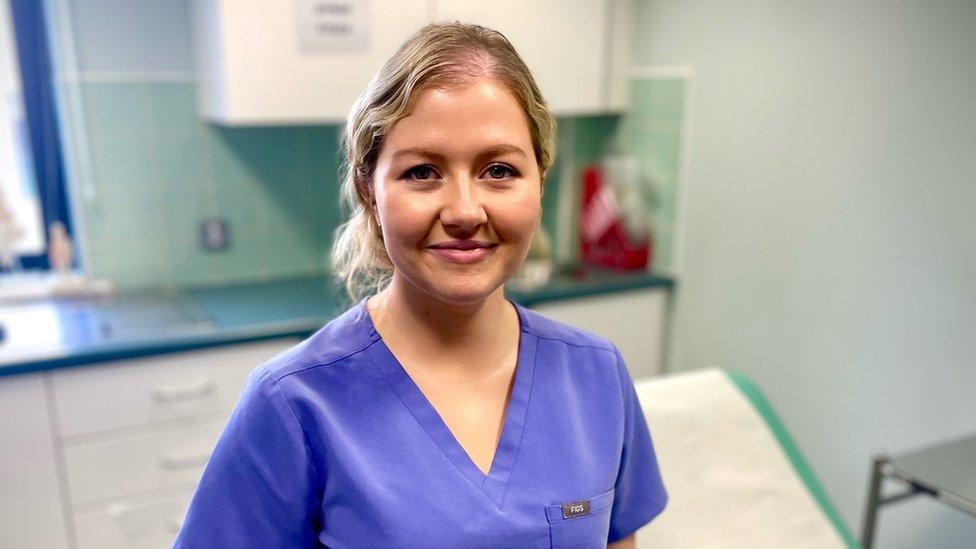
Laura McGartland says some of her colleagues have left Northern Ireland
Dr Mason, chair of Royal College of GPs in Northern Ireland, said: "We need to make Northern Ireland a more attractive place to work and we need to consider that our GPs of the future, our medical students and our early years doctors need to be able to see it as a really good career choice."
She told the BBC's Good Morning Ulster programme: "At the moment they are seeing the challenges, they are seeing the collapse, they are seeing the contract hand-backs.
"That's not a good place to be when you're trying to recruit GPs of the future to serve our population."
While in a lifetime, a person will receive more care from a GP than hospital staff - general practice receives just 5.4% per of the total health spend.
The report, which consulted 200 doctors, made a number of recommendations, including a state-backed insurance scheme and fellowship programmes so more GPs can further develop their skills in specialist fields.
A state-backed indemnity scheme would bring Northern Ireland in line with GP practices in England and Wales, where all GPs and their staff received clinical negligence cover if they are providing NHS services.
The high cost of having to front the insurance costs themselves means GP practice is more expensive in Northern Ireland, and many early-career GPs are therefore more likely to look elsewhere for work.
"We know our colleagues in the Department of Health are working up a business case around this and the cost to this is the cost to keeping GPs in the workforce here in Northern Ireland," Dr Mason said.
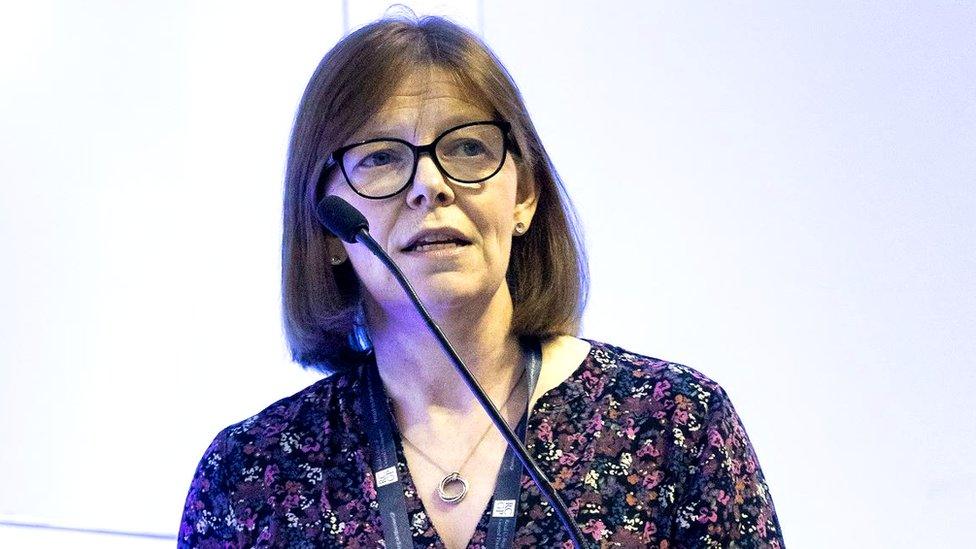
Dr Ursula Mason said GPs want to stay in their jobs but need help to overcome the challenges they face
"The cost of indemnity will be small in comparison to losing our GPs to the rest of the UK, Republic of Ireland and further afield."
There are currently only four available GP fellowships on offer in Northern Ireland, and unlike in other parts of the UK, fellowships are not available for young GPs working in substantive posts.
'More and more with less and less'
The Department of Health must also tackle the long-term issues facing general practice, by expanding GP training places and committing to increasing investment through a sustainable funding model, she added.
Health Minister Robin Swann said a budget for 2024/25 had not yet been set, but it was expected the overall financial position for all Stormont departments would remain very challenging.
He said a 6% funding uplift for GPs and their staff had recently been approved, and the annual number of GP training places had been increased from 65 in 2015/16 to 121.
"In addition my department has introduced the Attract, Recruit and Retain Scheme promoting recruitment in hard to recruit areas," he said.
New roles in general practices, such as advanced nurse practitioners and pharmacists, had been introduced to help GPs, he added.
Dr Mason added: "There are things that are happening, but what we are saying is that most of what's happening needs to happen quicker, it needs to happen on a wider scale and there are other things that would help our GPs stay in the workforce.
"The fundamental thing when we spoke to GPs across the country is they really want to stay in the job.
"But currently trying to do more and more with less and less is making it harder and harder for GP practices to stay open."
Related topics
- Published9 January 2024
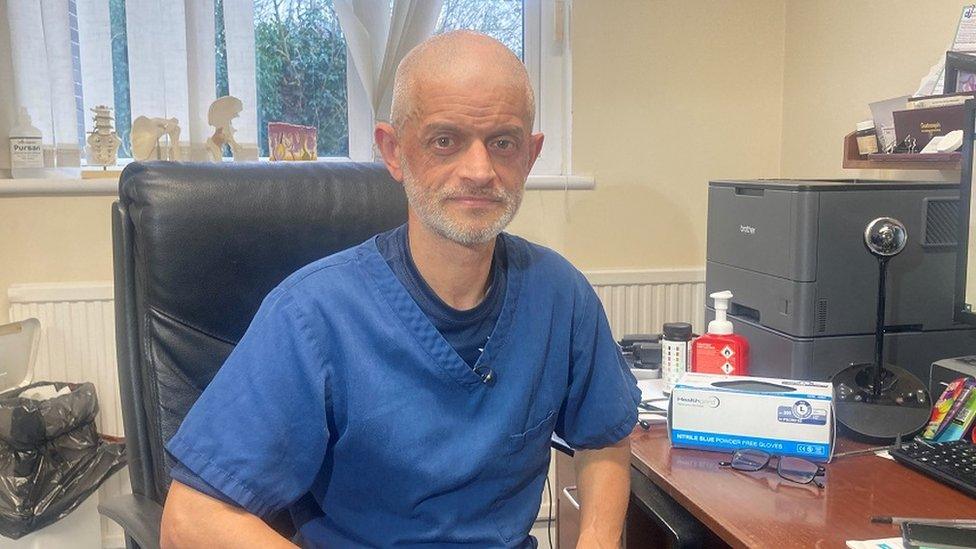
- Published26 April 2023
